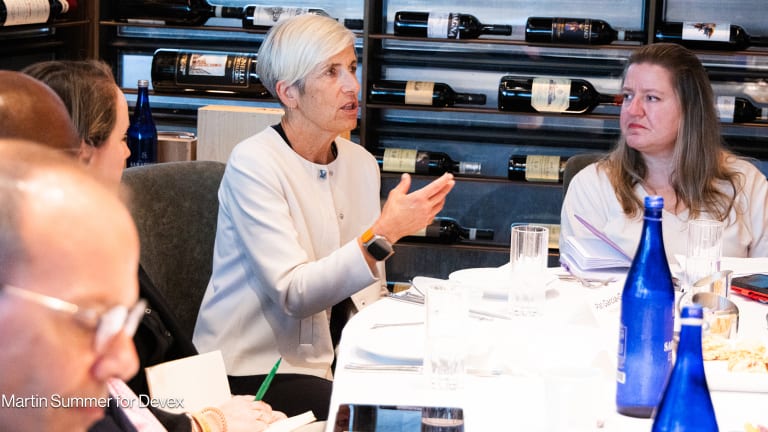
In the continuing fight against COVID-19, international public health leaders have set a goal both audacious and achievable: 70% of those eligible for COVID-19 vaccines will be vaccinated by mid-2022.
If this goal is met, it will in part be due to the breathtaking speed with which new vaccines have been developed — most of which represent new technologies that also have promise for other diseases — as well as the collective will that has forged important new global and regional partnerships, such as COVAX and the African Vaccine Acquisition Trust. Both promise to accelerate the deployment and use of these new vaccines.
Even so, the lagging availability and use of COVID-19 vaccines in resource-constrained countries is a clear reminder that challenges and hard work remain. As of Nov. 16, fewer than 5% of people in low-income countries have been vaccinated. Currently, lower-income countries that are mainly reliant on receiving vaccines through COVAX or bilateral donations are often experiencing lower vaccine coverage.
The good news is that the supply of vaccines to low- and middle-income countries is projected to increase in the coming months, removing — or at least minimizing — supply as the primary barrier for these countries.
As supply increases, so too must the capacity of national systems to implement vaccination programs quickly and efficiently. While some would assume that most countries have these systems in place, unfortunately, it is often not the case. Vaccine deployment is well developed for childhood immunization programs, but very few LMICs have experience, and therefore the robust systems needed to deliver vaccines to adult populations — the very groups targeted for COVID-19 vaccination.
These systems include a wide variety of capacities, capabilities, and skills. Gathering reliable information on who and where target groups for vaccination are, building the supply chain for delivery and maintenance of vaccines and materials, creating effective advocacy programs, maintaining surveillance systems to track vaccine adverse events, evaluating vaccination in different target groups as well as vaccine dose use — all of these, and more, are components of a strong vaccine delivery system. In fact, they are the very elements that national annual influenza programs build, annually test, and maintain.
Influenza programs are a strong foundation for readiness
Recognizing the benefits of influenza vaccination programs for annual disease reduction and pandemic vaccine readiness, the Partnership for Influenza Vaccine Introduction was formed in 2013 to support the expansion and sustainability of influenza vaccination in LMICs. PIVI is a public-private partnership composed of ministries of health, technical subject matter experts, global public health partners, and vaccine industry members. It is based at The Task Force for Global Health and runs in close collaboration with the United States Centers for Disease Control and Prevention.
Strong vaccine delivery systems can help assure an efficient response that saves lives against influenza or COVID-19.
—Influenza vaccination requires experience in reaching health workers and other high-risk adult populations and regulatory, policy, and program management experience with multiple vaccine products/formulations. It requires the skills to build vaccine confidence in populations that aren’t often included in public health programs, and a good program should simultaneously strengthen systems for program evaluation, including safety surveillance and vaccine coverage, and build a workforce experienced in vaccinating adults.
A critical benefit of an influenza system is that it allows for annual refreshers on all of these capabilities and continuous strengthening of systems. Health workers remain trained and ready, adults recommended for vaccination are educated about the benefits of vaccination, and countries have capabilities in place to import and deploy the vaccines.
Not surprisingly, countries with influenza vaccination programs in place at the start of the 2009 swine flu, or H1N1 virus, pandemic used vaccines faster than those without, and health workers who had received seasonal influenza vaccines were more likely to receive H1N1 virus vaccines — protecting them and protecting their patients.
COVID-19 will not be the last pandemic we fight
As influenza vaccine program managers in PIVI partner countries, we can report that the skills and public health programs built or strengthened by influenza vaccination programs have supported the planning, implementation, and evaluation of COVID-19 vaccination.
We have used influenza micro plans as the basis for our National Deployment and Vaccination Plans for COVID-19, as key target groups have been enumerated and mapped each year for influenza vaccine campaigns.
In addition, cold chain and waste management equipment and staff have been repurposed for COVID-19 vaccine delivery. The skills gained through annual regulatory approvals of influenza vaccines and procurement processes have enabled more nimble approvals of COVID-19 vaccines, and amending the vaccinator training curriculum and using the same staff from influenza training has saved precious time.
Utilizing the same vaccination sites for COVID-19 that are used for influenza, and vice versa, we are also prepared to vaccinate using both vaccines from September to November. Importantly, we used and improved the same monitoring systems refined for influenza, for vaccine tracking, and vaccine safety protocols for the COVID-19 vaccination program evaluations.
While planning and delivering COVID-19 vaccines is a uniquely challenging enterprise given the scope and speed required for success, seasonal influenza programs are and will be important components to efficient and effective vaccination in every country. Many countries, especially LMICs, will be conducting national immunization programs targeting health workers and other adults for the first time. It is critical to recognize that the experience, capabilities, skills, and programs built during this pandemic will be needed in the future.
While we don’t yet know whether or how often COVID-19 vaccination will be required, we are certain of the need of and value for annual influenza vaccination. We also know that influenza remains a significant threat with pandemic potential. We can and must be ready, and strong vaccine delivery systems can help assure an efficient response that saves lives against influenza or COVID-19.










